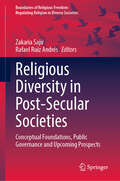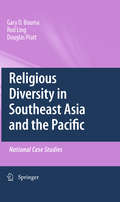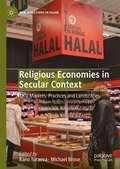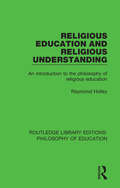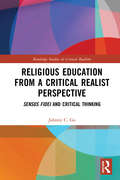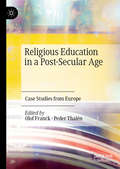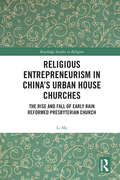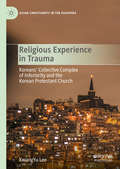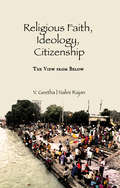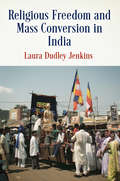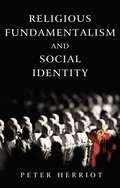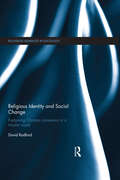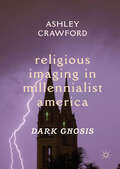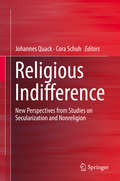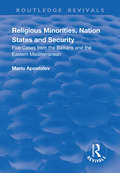- Table View
- List View
Religious Diversity in Post-Secular Societies: Conceptual Foundations, Public Governance and Upcoming Prospects (Boundaries of Religious Freedom: Regulating Religion in Diverse Societies)
by Zakaria Sajir Rafael Ruiz AndrésThis book offers a multidisciplinary exploration of one of the defining characteristics of post-secular societies: religious diversity. Drawing from the sociology of religion, the sociology of migration, and related fields, it critically examines the interaction between religion, diversity, and secular governance, challenging conventional approaches to managing pluralism in contemporary contexts. Organized into three sections, the book explores: Theoretical and Conceptual Foundations: Establishing core frameworks for understanding post-secularization, pluralistic societies, and the intricate dynamics between religion and diversity. Regulating Religion in Postsecular and Diverse Societies: Analyzing policy innovation, comparative case studies, and practical challenges in managing religious diversity within secular governance structures. Navigating the Future: Prospects and Challenges of Diversity Governance in Post-Secular Contexts: Addressing emerging trends such as digital transformations, the politicization of religious identities, and the evolving role of religious traditions in fostering inclusivity and resilience. Featuring contributions from leading scholars and emerging researchers, this volume provides a multidimensional perspective on debates spanning sociology, anthropology, law, and public policy. Through socio-historical examples and case studies, it examines pressing topics such as religious pluralism in secular governance, diversity management strategies, and the transformative impact of digital technologies on religious expression. At its core, the book is framed by two key concepts: post-secularization and diversity. It reexamines religion&’s evolving role in secularized societies, taking religious plurality—not the disappearance of religion—as a starting point for exploring secularity. This work is an essential resource for students, researchers, educators, policymakers, and professionals seeking actionable insights into critical debates on religion, migration, diversity, and secular governance in today&’s globalized and digitalized world.
Religious Diversity in Southeast Asia and the Pacific
by Gary D. Bouma Rodney Ling Douglas PrattReligious diversity is now a social fact in most countries of the world. While reports of the impact of religious diversity on Europe and North America are reasonably well-known, the ways in which Southeast Asia and Asia Pacific are religiously diverse and the ways this diversity has been managed are not. This book addresses this lack of information about one of the largest and most diverse regions of the world. It describes the religious diversity of 27 nations, as large and complex as Indonesia and as small as Tuvalu, outlining the current issues and the basic policy approaches to religious diversity. Southeast Asia and the Pacific Islands are portrayed as a living laboratory of various religious blends, with a wide variance of histories and many different approaches to managing religious diversity. While interesting in their own right, a study of these nations provides a wealth of case studies of diversity management - most of them stories of success and inclusion.
Religious Economies in Secular Context: Halal Markets, Practices and Landscapes (New Directions in Islam)
by Rano Turaeva Michael BroseThis edited collection is one of the few sociological and anthropological studies of Halal markets. The chapters inquire into the legal and religious aspects of Halal markets in non-Muslim contexts or the countries where the label 'Halal' matters, and is not taken for granted as it is the case in most of the Muslim world where it is an accepted norm. In many countries, 'Halal' has become a type of brand used to market food and cosmetic products. This is an effective marketing strategy because it appeals directly to Muslims, but also increasingly to non-Muslims who seek pure, fresh products. In this case 'Halal' implies attributes similar to other brands where quality and purity is guaranteed, such as Fair Trade, Bio or organic in the US and Europe, but with the additional appeal to prospective Muslim consumers that it satisfies Islamic norms.The book consists of contributions on Halal economies in non-Muslim societies dealing with such dilemmas as rational thinking and halal philosophy within various fields of halal economy such as regulation, production, marketing, service delivery and consumption.
Religious Education and Critical Realism: Knowledge, Reality and Religious Literacy (New Studies in Critical Realism and Spirituality (Routledge Critical Realism))
by Andrew WrightReligious Education and Critical Realism: Knowledge, Reality and Religious Literacy seeks to bring the enterprise of religious education in schools, colleges and universities into conversation with the philosophy of Critical Realism. This book addresses the problem, not of the substance of our primal beliefs about the ultimate nature of reality and our place in the ultimate order-of-things, but of the process through which we might attend to questions of substance in more attentive, reasonable, responsible and intelligent ways. This book unpacks the impact of modern and post-modern thought on key topics whilst also generating a new critically realistic vision. Offering an account of the relationship between Religious Education and Critical Realism, this book is essential reading for students, scholars and practitioners interested in philosophy, theology and education.
Religious Education and Religious Understanding: An Introduction to the Philosophy of Religious Education (Routledge Library Editions: Philosophy of Education #10)
by Raymond HolleyThis book, first published in 1978, introduces readers to the topic of the philosophy of religious education in a way which demands little philosophical expertise on their part. It puts forward a particular theory of religious education in such a way that most of the major questions are faced and sufficient answers given to enable readers to examine the theory critically, and so further the development of philosophy and education.
Religious Education from a Critical Realist Perspective: Sensus Fidei and Critical Thinking (Routledge Studies in Critical Realism)
by Johnny C. GoThis book examines the possibility and necessity of critical thinking in religious education through the lenses of critical realism and the Christian doctrine of sensus fidei (‘sense of faith’). Drawing on Bhaskar’s original critical realism and data from a survey of over a thousand teachers in the Philippines, the author argues for a view of critical thinking based on components of ‘disposition’ and ‘competence’. As such, critical thinking becomes the expression of a commitment to judgemental rationality and, in a Christian religious education, is guided by the individual’s sensus fidei. A philosophical and theological discussion of the process of coming to know in the religious domain, Religious Education from a Critical Realist Perspective also offers concrete recommendations on how to promote the practice of religious critical thinking in confessional religious education classrooms. As such, it will appeal to scholars of philosophy, theology and pedagogy with interests in religious education and curriculum development.
Religious Education in a Post-Secular Age: Case Studies from Europe
by Olof Franck Peder ThalénThis book analyzes the changes and shifts in religious education in Europe over the past 50 years. In a post-secular age, it has become increasingly difficult to make sharp distinctions between what is religious and non-religious, confessional and non-confessional. Reforms in religious education in Sweden in the 1960s appeared as part of a process of wider secular liberalization, giving more credence to the idea of absolute neutrality in religious education. However drastic shifts in society, culture and the European religious landscape raise the need for a reevaluation of the foundations of religious education. Drawing on a range of case studies from across Europe, this book will appeal to students and scholars of religious education as well as post-secular education more generally.
Religious Entrepreneurism in China’s Urban House Churches: The Rise and Fall of Early Rain Reformed Presbyterian Church (Routledge Studies in Religion)
by Li MaThis book offers a unique historical documentation of the development of the ambitious religious entrepreneurism by leaders of the Early Rain church (and later Western China Presbytery leadership), in an effort to gain social influence in China through local institution-building and global public image management. It unravels the social processes of how this Christian community with a public image of defending religious freedom in China was undermined by an internal loss of moral authority. Based on publicly available texts from Chinese social media that aren’t readily available in the West as well as in-depth interviews, it is framed by existing scholarship in social theories of the public sphere, charismatic domination in social transition, and the role of power in organizational behaviour. These churches’ stories show how Christianity, which has long been politically marginalized in communist China, has not only adapted and challenged the socio-political status quo, but how it was also ironically shaped by the political culture. This is an insightful and critical ethnographic study of one of modern China’s most famous house churches. As such, it will be of great interest to scholars of Religion in China as well as those working in Religious Studies, Asian studies, Chinese studies, and Mission Studies more generally.
Religious Environmental Activism: Emerging Conflicts and Tensions in Earth Stewardship (Routledge Studies in Religion and Environment)
by Jens Koehrsen Julia Blanc Fabian HuberThis volume explores how religious and spiritual actors engage for environmental protection and fight against climate change. Climate change and sustainability are increasingly prominent topics among religious and spiritual groups. Different faith traditions have developed "green" theologies, launched environmental protection projects and issued public statements on climate change. Against this background, academic scholarship has raised optimistic claims about the strong potentials of religions to address environmental challenges. Taking a critical stance with regard to these claims, the chapters in this volume show that religious environmentalism is an embattled terrain. Tensions are an inherent part of religious environmentalism. These do not necessarily manifest themselves in open clashes between different parties but in different actions, views, theologies, ambivalences, misunderstandings, and sometimes mistrust. Keeping below the surface, these tensions can create effective barriers for religious environmentalism. The chapters examine how tensions are manifested and dealt with through a range of empirical case studies in various world regions. Covering different religious and spiritual traditions, they reflect on intradenominational, interdenominational, interreligious, and religious-societal tensions. Thereby, this volume sheds new light on the problems that religions face when they seek to take an active role in today’s societal challenges.
Religious Experience in Trauma: Koreans’ Collective Complex of Inferiority and the Korean Protestant Church (Asian Christianity in the Diaspora)
by KwangYu LeeThis book offers a psychohistorical analysis of the rapid growth of the Korean Protestant Church. KwangYu Lee looks at some of the traumatic historical events of Korea in the 20th century, including the fall of the Joseon Dynasty (1392-1910), the Japanese Occupation (1910-1945), the Korean War (1950-1953), and the Korean Military Dictatorship (1961-1987), and explores the psychological impacts of these events on the collective unconsciousness of Koreans. He argues that Koreans’ collective (or cultural) complex of inferiority, which was caused and gradually exacerbated by these traumatic events, along with their psychological relationships with their two colonizers—the Japanese and Americans—prompted them to convert to Korean Protestantism en masse as a means to avoid their psychological pains and to fulfil their futile desire to become like Americans, their overtly idealized psychological-object.
Religious Faith, Ideology, Citizenship: The View from Below
by V. Geetha Nalini RajanThis book looks at the triadic relations between faith, the state and political actors, and the ideas that move them. It comprises a set of essays on diverse histories and ideas, ranging from Gandhian civic action to radical free thought in colonial India, from liberation theologies, that take their cue from specific and lived experiences of oppression and humiliation, to the universalism promised by an expansive Islam. Deploying gender and caste as the central analytical categories, these essays suggest that equality and justice rest on the strength and vitality of the exchanges between the worlds of the civic, the religious and the state, and not on their strict separation. Going beyond time-honoured dualities — between the secular and the communal (especially in the Indian context), or the secular and the pre-modern — the book joins the lively debates on secularism that have emerged in the 21st century in West, South and South-east Asia.
Religious Freedom and Mass Conversion in India (Pennsylvania Studies in Human Rights)
by Laura JenkinsHinduism is the largest religion in India, encompassing roughly 80 percent of the population, while 14 percent of the population practices Islam and the remaining 6 percent adheres to other religions. <P><P>The right to "freely profess, practice, and propagate religion" in India's constitution is one of the most comprehensive articulations of the right to religious freedom. Yet from the late colonial era to the present, mass conversions to minority religions have inflamed majority-minority relations in India and complicated the exercise of this right. <P><P>In Religious Freedom and Mass Conversion in India, Laura Dudley Jenkins examines three mass conversion movements in India: among Christians in the 1930s, Dalit Buddhists in the 1950s, and Mizo Jews in the 2000s. Critics of these movements claimed mass converts were victims of overzealous proselytizers promising material benefits, but defenders insisted the converts were individuals choosing to convert for spiritual reasons. >{?>{?Jenkins traces the origins of these opposing arguments to the 1930s and 1940s, when emerging human rights frameworks and early social scientific studies of religion posited an ideal convert: an individual making a purely spiritual choice. However, she observes that India's mass conversions did not adhere to this model and therefore sparked scrutiny of mass converts' individual agency and spiritual sincerity. <P><P>Jenkins demonstrates that the preoccupation with converts' agency and sincerity has resulted in significant challenges to religious freedom. One is the proliferation of legislation limiting induced conversions. Another is the restriction of affirmative action rights of low caste people who choose to practice Islam or Christianity. Last, incendiary rumors are intentionally spread of women being converted to Islam via seduction. <P><P>Religious Freedom and Mass Conversion in India illuminates the ways in which these tactics immobilize potential converts, reinforce damaging assumptions about women, lower castes, and religious minorities, and continue to restrict religious freedom in India today.
Religious Freedom and the Global Regulation of Ayahuasca (Routledge Studies in Religion)
by Beatriz Caiuby Labate Clancy CavnarThis book offers a comprehensive view of the legal, political, and ethical challenges related to the global regulation of ayahuasca, bringing together an international and interdisciplinary group of scholars. Ayahuasca is a psychoactive brew containing DMT, which is a Schedule I substance under the United Nations Convention on Psychotropic Substances, and the legality of its ritual use has been interpreted differently throughout the world. The chapters in this volume reflect on the complex implications of the international expansion of ayahuasca, from health, spirituality, and human rights impacts on individuals, to legal and policy impacts on national governments. While freedom of religion is generally protected, this protection depends on the recognition of a religion’s legitimacy, and whether particular practices may be deemed a threat to public health, safety or morality. Through acomparative analysis of different contexts in North America, South America and Europe in which ayahuasca is consumed, the book investigates the conceptual, philosophical, and legal distinctions among the fields of shamanism, religion, and medicine. It will be particularly relevant to scholars with an interest in Indigenous religion and in religion and law.
Religious Freedom and the Law: Emerging Contexts for Freedom for and from Religion (ICLARS Series on Law and Religion)
by Brett G. Scharffs Asher Maoz Ashley Isaacson WoolleyThis volume presents a timely analysis of some of the current controversies relating to freedom for religion and freedom from religion that have dominated headlines worldwide. The collection trains the lens closely on select issues and contexts to provide detailed snapshots of the ways in which freedom for and from religion are conceptualized, protected, neglected, and negotiated in diverse situations and locations. A broad range of issues including migration, education, the public space, prisons and healthcare are discussed drawing examples from Europe, the US, Asia, Africa and South America. Including contributions from leading experts in the field, the book will be essential reading for researchers and policy-makers interested in Law and Religion.
Religious Fundamentalism and Social Identity
by Peter HerriotThe attacks on the World Trade Centre and the Pentagon in the United States of September 11th, 2001 brought the phenomenon of religious fundamentalism to the world's attention.Sociological research has clearly demonstrated that fundamentalists are primarily reacting against modernity, and believe that they are fighting for the very survival of their faith against the secular enemy. But we understand very little about how and why people join fundamentalist movements and embrace a set of beliefs, values and norms of behaviour which are counter-cultural. This is essentially a question for social psychology, since it involves both social relations and individual selves. Drawing on a broad theoretical perspective, social identity theory, Peter Herriot addresses two key questions: why do fundamentalists identify themselves as an in-group fighting against various out-groups? And how do the psychological needs for self-esteem and meaning motivate them? Case studies of Mohammed Atta, the leader of the 9/11 hijackers, and of the current controversy in the Anglican Church about gay priests and bishops, demonstrate how fruitfully this theory can be applied to fundamentalist conflicts. It also offers psychologically sensible ways of managing such conflicts, rather than treating fundamentalists as an enemy to be defeated. Religious Fundamentalism and Social Identity is unique in applying social identity theory to fundamentalism, and rare in that it provides psychological (in addition to sociological) analyses of the phenomenon. It is a valuable resource for courses in social psychology which seek to demonstrate the applicability of social psychological theory to the real world.
Religious Hair Display and Its Meanings (Popular Culture, Religion and Society. A Social-Scientific Approach #4)
by William C. Innes, JrThis book explores the fascinating world of religious hair observances within six religious traditions that account for 77% of the world’s adherents: Judaism, Christianity, Islam, Hinduism, Buddhism, and Sikhism. Symbolic use of hair has been, and remains, prevalent in all six and carries significant amounts of religious and social meaning. Hair is a unique body substance. It can be shaped and colored, removed from us without pain but still retain an individual’s essence, signal our age, sex, and sexual maturity, and much, much more. The book’s approach is to situate each practice within its tradition. That requires a study of its foundational leaders and their teachings, sacred texts (where they mention hair), its rites and rituals, ideas of religious power and subsequent historical development. Contemporary practitioners are interviewed for their motivations. Even more insight can be gleaned by searching beyond an overt religious purpose. Social scientists from anthropology, sociology, psychology, and related fields bring their research to deliver added perceptions.The author reveals how hair practices are created from ancient psychological and cultural impulses, become modified by time, culture and religious intent, and are adopted by adherents for reasons ranging from personal religious expression to group identity. This book is written for the interested observer of our increasingly diverse society and for the student of comparative religion and sociology. It will change forever how you see hair.
Religious Hatred and Human Conflict: Psychodynamic Approaches to Insight and Intervention
by Andrew Floyer AclandReligious Hatred and Human Conflict focuses the lens of psychodynamic psychology on a phenomenon that often confounds conventional thinking – the intensity of conflict with religious or quasi-religious dimensions. The book highlights six dimensions of religion: identity, doctrine and practice, emotion and experience, mythology, sacred values and power and control, exploring how these can give rise to religious hatred and lead to marginalisation, persecution and even genocide. It also explores reasons for the evolution of religion and religious hatred, and their relationship with human behaviour through contemporary issues such as fundamentalism, martyrdom, clerical narcissism and apocalyptic belief. Acland examines how religious hatred and conflict may be transcended by facilitating processes of dialogue and diapraxis which enable a systematic understanding of prejudices and projections. Last, it offers practical methods and strategies for helping individuals and communities grow beyond the constraints of religious hatred, treating religious hatred as a psycho-spiritual problem that requires self-understanding. Identifying the implications for professionals in conflict resolution and mediation, politicians, community leaders, diplomats and anyone working to prevent or reduce conflict where religious belief is a factor, this book sets out how those tasked with intervening can respond to the challenges involved. It will also be highly relevant reading for students and researchers of psychology and religious studies.
Religious Identity and Social Change: Explaining Christian conversion in a Muslim world (Routledge Advances in Sociology)
by David RadfordReligious Identity and Social Change offers a macro and micro analysis of the dynamics of rapid social and religious change occurring within the Muslim world. Drawing on rich ethnographic and quantitative research in Kyrgyzstan, Central Asia, David Radford provides theoretical insight into the nature of religious and social change and ethnic identity transformation exploring significant questions concerning why people convert and what happens when they do so. A crisis of identity occurs when religious conversion takes place, especially from one major religious tradition (Islam) to another (Christianity); and where religious identity is intimately connected to ethnic and national identity. Radford argues for the importance of recognising the socially constructed nature of identity involving the dynamic interplay between human agency, culture and social networks. Kyrgyz Christians have been active agents in bringing religious and identity transformation building upon the contextual parameters in which they are situated.
Religious Ideology and the Roots of the Global Jihad: Salafi Jihadism and International Order
by John A. TurnerThe events of 9/11 prompted questions as to the origins, nature and purpose of international jihadist organisations. In particular, why had they chosen to target the US and the West in general? Turner's book provides a unique, holistic insight into these debates, taking into account historical perceptions and ideology as key factors.
Religious Imaging in Millennialist America: Dark Gnosis
by Ashley CrawfordAshley Crawford investigates how such figures as Ben Marcus, Matthew Barney, and David Lynch—among other artists, novelists, and film directors—utilize religious themes and images via Christianity, Judaism, and Mormonism to form essentially mutated variations of mainstream belief systems. He seeks to determine what drives contemporary artists to deliver implicitly religious imagery within a ‘secular’ context. Particularly, how religious heritage and language, and the mutations within those, have impacted American culture to partake in an aesthetic of apocalyptism that underwrites it.
Religious Indifference
by Johannes Quack Cora SchuhThis book provides a conceptually and empirically rich introduction to religious indifference on the basis of original anthropological, historical and sociological research. Religious indifference is a central category for understanding contemporary societies, and a controversial one. For some scholars, a growing religious indifference indicates a dramatic decline in religiosity and epitomizes the endpoint of secularization processes. Others view it as an indicator of moral apathy and philosophical nihilism, whilst yet others see it as paving the way for new forms of political tolerance and solidarity. This volume describes and analyses the symbolic power of religious indifference and the conceptual contestations surrounding it. Detailed case studies cover anthropological and qualitative data from the UK, Germany, Estonia, the USA, Canada, and India analyse large quantitative data sets, and provide philosophical-literary inquiries into the phenomenon. They highlight how, for different actors and agendas, religious indifference can constitute an objective or a challenge. Pursuing a relational approach to non-religion, the book conceptualizes religious indifference in its interrelatedness with religion as well as more avowed forms of non-religion.
Religious Internationals in the Modern World
by Abigail Green Vincent ViaeneTracing the emergence of 'Religious Internationals' as a distinctive new phenomenon in world history, this book transforms our understanding of the role of religion in our modern world. Through in-depth studies comparing the experiences of Buddhists, Christians, Hindus, Jews and Muslims, leading experts shed new light on 'global civil society'.
Religious Literacy, Law and History: Perspectives on European Pluralist Societies (ICLARS Series on Law and Religion)
by Alberto Melloni Francesca CadedduThe book profiles some of the macro and micro factors that have impact on European religious literacy. It seeks to understand religious illiteracy and its effects on the social and political milieu through the framing of the historical, institutional, religious, social, juridical and educational conditions within which it arises. Divided into four parts, in the first one, One literacy, more literacies?, the book defines the basic concepts underpinning the question of religious illiteracy in Europe. Part II, Understanding illiteracies, debating disciplines?, highlights the theological, philosophical, historical and political roots of the phenomenon, looking at the main nodes that are both the reasons religious illiteracy is widespread and the starting points for literacy strategies. Part III, Building literacy, shaping alphabets, examines the mix of knowledge and competences acquired about religion and from religion at school as well as through the media, with a critical perspective on what could be done both in the schools and for the improvement of journalists’ religious literacy. Part IV, Views and experiences, presents the reader with the opportunity to learn from three different case studies: religious literacy in the media, religious illiteracy and European Islam, and a Jewish approach to religious literacy. Building on existing literature, the volume takes a scientific approach which is enriched by interdisciplinary and transnational perspectives, and deep entrenchment in historical methodology.
Religious Medicine: History and Evolution of Indian Medicine
by Kenneth G. ZyskThis book outlines the history and development of the Indian healing arts from Vedic medicine to classical ayurveda. It elucidates a healing tradition based on magico-religious beliefs and practices.
Religious Minorities, Nation States and Security: Five Cases from the Balkans and the Eastern Mediterranean (Routledge Revivals Ser.)
by Mario ApostolovThis title was first published in 2001. Why, in this contemporary secular age, does violent conflict among confessional communities still occur? Covering several key conflicts of recent years in one of the most dynamic areas of the world, the Eastern Mediterranean and the Balkans, Mario Apostolov uses both interpretative and comparative analysis to answer this question. His versatile approach makes for an engaging account that makes an important contribution to the current debate surrounding such conflicts.The author focuses on five case studies taken from the traditional zone of contact between Christianity and Islam:- The Copts- The Palestinian Christians- The Lebanese communities- The Pomaks- The communities of Bosnia-HerzegovinaThe book examines the relationship between these issues and communal mobilisation, the collective use of violence and the problems of international security. An informative study for students, academics, policy makers and personnel in international organizations with an interest in communal conflict and security.
